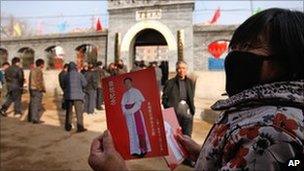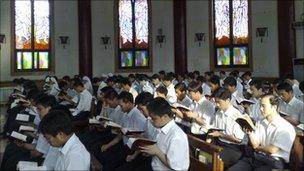China ordains bishop despite Vatican objection
- Published

The ordination ceremony was carried out at Chengde's Pingquan Church
China's state-backed Catholic church has challenged the Vatican by ordaining a bishop without papal approval - the first such ceremony since 2006.
Guo Jincao's ordination was carried out in the north-eastern city of Chengde amid a strong security presence.
Eight Vatican-approved bishops are believed to have been forced to attend the ceremony.
China's millions of Catholics are split between followers of Pope Benedict XVI and members of the state-backed church.
China and the Vatican have had no diplomatic ties since the 1950s, when Beijing expelled foreign clergy.
'Slap in the face'
Guo Jincai was ordained at Chengde's Pingquan church on Saturday morning.
Hundreds of people - including government officials - attended the ceremony, according to AsiaNews, a Vatican-affiliated missionary news agency that closely follows religious affairs in China.
The agency said that eight bishops, who were in communion with the Vatican, were also present.
China's state-back Patriotic Chinese Church has so far made no public comment on the ordination.

There are an estimated 10 million Catholics in China
The Vatican warned earlier this week that it would regard any attempt by Beijing to force Chinese Catholic bishops, who were in communion with Rome, to attend the ceremony in Chengde as a grave violation of freedom of religion and of conscience.
Hong Kong's Cardinal Joseph Zen had called the Chinese decision a "shameful" and "illegal" act.
Attempts by the Vatican to heal the breach have so far met with only limited success but in recent years the names of most new Chinese bishops have been submitted to Rome for prior approval, the BBC's David Willey in Rome reports.
Our correspondent says that now relations between the Vatican and Beijing appear to have take a major step backwards.
He adds that Guo Jincai is the deputy head of Patriotic Chinese Church so his consecration is a clear slap in the face for Rome.
The reason why the appointment of new Chinese bishops has become such a contentious issue is that more than 40 Catholic dioceses in China are without a bishop after the death of the incumbent.
For the Chinese the appointment of a new bishop is a political act which cannot be delegated to a foreigner in Rome, our correspondent says.
But as far as the Vatican is concerned, the Chinese church is guilty of a serious breach of ecclesiastical discipline.
There are an estimated 10 million Catholics in China, most of whom belong to the Patriotic Chinese Catholic Church.
But there are several million more who belong to an underground Catholic Church, which accepts the sole authority of the Pope in Rome to appoint new bishops.
- Published18 November 2010
- Published24 August 2010